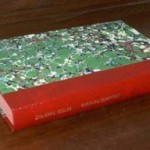James Lee Burke, Pegasus Descending
£70.00
£66.00
When it comes to literate and violent motifs in a major detective series James Lee Burke has few peers. For more than two decades the Dave Robicheaux detective series has blossomed and each of the recent novels have been lauded by the critics. Burke is a major force in American crime. This novel contains an appreciation by critic and mystery writer James Sallis.
Out of Stock

 Following early attempts at literary fiction and a thriller issued by a university press James Lee Burke found a niche with the Dave Robicheaux detective novel Neon Rain (1987). It was a breakthrough that quickly earned him an Edgar for best mystery with Black Cherry Blues, his third novel in the series. This book, like the others in the series is about a deep feeling for the South, human dignity and redemption. What Burke brings to the genre is an emotional engagement; listen to this: “. . . I had found the edge. The place where you unstrap all your fastenings to the earth, to what you are what you have been, where you flame out on the edge of the spheres, and the sun and moon become eclipsed and the world below is as dead and remote and without interest as if it were glazed with ice. ”
Following early attempts at literary fiction and a thriller issued by a university press James Lee Burke found a niche with the Dave Robicheaux detective novel Neon Rain (1987). It was a breakthrough that quickly earned him an Edgar for best mystery with Black Cherry Blues, his third novel in the series. This book, like the others in the series is about a deep feeling for the South, human dignity and redemption. What Burke brings to the genre is an emotional engagement; listen to this: “. . . I had found the edge. The place where you unstrap all your fastenings to the earth, to what you are what you have been, where you flame out on the edge of the spheres, and the sun and moon become eclipsed and the world below is as dead and remote and without interest as if it were glazed with ice. ”
Plotline for Pegasus Descending (2006) from the James Lee Burke site: Detective Dave Robicheaux is facing the most painful and dangerous case of his career. A troubled young woman breezes into his hometown of New Iberia, Louisiana. She happens to be the daughter of Robicheaux’s onetime best friend – a friend he witnessed gunned down in a bank robbery, a tragedy that forever changed Robicheaux’s life. In Pegasus Descending, James Lee Burke again explores psyches as much as evidence, and tries to make sense of human behavior as well as of his characters’ crimes. Richly atmospheric, frightening in its sudden violence, and replete with the sort of puzzles only the best crime fiction creates, Burke’s latest novel is an unforgettable roller coaster of passion, surprise, and regret. The twists begin when Trish Klein — the only offspring of Robicheaux’s Vietnam-era buddy — starts passing marked hundred-dollar bills in local casinos. Is she a good kid gone bad? A victim’s child seeking revenge? A promiscuous beauty seducing everyone good within her grasp? And how does her behavior relate to the apparent suicide of another “good” girl, an ace student named Yvonne Darbonne, who apparently participated in a college frat orgy before her death?
James Lee Burke has become the foremost American crime writer of his time. Although an entertainer Burke’s Robicheaux series (now extending to eighteen dense novels) marks out an outstanding achievement in creating a much followed flawed character with real depth and in extending the crime genre into areas of wider social concern. Jim’s colleague Jim Sallis provides us with his insights into the writer in his appreciation. The Scorpion Press edition comprised 80 numbered and signed copies and a further 15 lettered for presentation purposes. The book on offer is the numbered and signed state.

 Bernard Cornwell, Sharpe’s Escape
Bernard Cornwell, Sharpe’s Escape
 Breese (edited): Breese’s Guide to Modern First Editions (2000 edition)
Breese (edited): Breese’s Guide to Modern First Editions (2000 edition)

Rating by James Sallis on May 18, 2012 :
Extract from the Appreciation by James Sallis
“The wrong guy is writing this. I believe the essays of appreciation you find in the fronts of books should be written by scholars of the genre or masters of the craft or, at the very least, colleagues of equal peer. I am none of these things. Therefore I feel both honoured and humbled as I write this and ultimately lacking. For James Lee Burke has no equal peer. And though there are masters of the craft of writing in general and the crime novel in particular, all of them could still learn something from this writers’ writer. And I believe that there is little doubt that the scholars will be reading and rereading his prose well into the new millennium. “The evening sky was streaked with purple, the colour of torn plums . . . ” Those were the first words of James Lee Burke I ever read. And I distinctly remember making the discovery. I had read no review, seen no advertisement, knew nothing about this book or its writer. I was simply browsing in a book store in Los Angeles and happened to open up The Neon Rain. This was more than a decade ago at a time when I was just putting together the thoughts on how I soon would begin to write my first novel. Reading that first line from Burke changed me from a browser to a buyer and, ultimately, to a believer. For my first line instincts were right. I had stumbled onto something rare. I had found the real thing, a writer whose work transcends genre and elevates it to art. With a single line of words I knew it. Burke had entered my conscious and flipped on the movie projector of imagination. I could see his words. I could see his magic. Reading the full book confirmed it – a confirmation renewed with each novel Burke has written since. A confirmation sure to be renewed within the pages here. You should know, I wrote the line above from memory. The copy of The Neon Rain I bought that day has long since disappeared as I loaned it over and over again to those who came to my shelves to borrow. Eventually, it did not return and I like to think it is still out there somewhere and still in motion, being read and then passed on again and again. But without the book in hand I remember that first line always”.
Rating by Blogcritics.org on May 18, 2012 :
“Father Jimmie Dolan closes his part in James Lee Burke’s Last Car to Elysian Fields by confronting Detective Dave Robicheaux on his moral blind spots, comparing him with the detective’s tortured and obsessed antagonist in the story, the Irish assassin Max Coll: “Don’t deceive yourself. You’re a violent and driven man, Dave, just like Max Coll.”
Violent and driven. Over the course of 14 novels, Louisiana author James Lee Burke has carefully evolved the crime procedural character Detective Dave Robicheaux from his drunk and fractured genesis as a New Orleans Police Department Homicide detective in Neon Rain to his struggling, AA-reformed, Vietnam-damaged New Iberia Sheriff’s Detective /bait shop owner in In the Electric Mist with Confederate Dead. He then moved on to his increasingly violent, almost-spinning-out-of-control deranged late-middle age presence in Last Car to Elysian Fields and Crusader’s Cross.
In Burke’s newest tale, Pegasus Descending, Dave Robicheaux readily describes himself in his account of his NOPD partner Clete Purcel, “He was hated and feared both by the Mob and many of his old colleagues at NOPD. His detractors tried to dismiss him as a drunk and an addict and a whoremonger, but in truth Clete Purcel was one of the most intelligent and decent men I ever knew, complex in ways I could not guess at.”
…complex in ways I could not guess at.
Burke’s Robicheaux is one of the most compelling procedural characters in popular fiction. He is more densely flawed and multidimensional than Michael Connelly’s Hieronymus Bosch or Patricia Cornwell’s Pete Marino in the later Kay Scarpetta novels. Robicheaux lives in the shadow of his past and that past is an almost tangible and temporal entity to him.
Early in Pegasus Descending, Robicheaux summons that famous Faulknerian phrase, “…the past is not only still with us, the past is not even the past…” For the troubled Robicheaux, this is certainly true. Burke perfectly captures the emotional landscape of the alcoholic and the alcoholic’s possession by the past. Son of an oil rig roughneck and a mother of questionable scruples (who was mysteriously murdered), Robicheaux has a past to be possessed by. Add to a challenged childhood a soundly horrific experience in Vietnam mixed with a deluge of alcohol and one has the makings for quite the dysfunctional cocktail.
Robicheaux’s post-Vietnam experience is littered with ex-wives, friends, burned bridges, lost jobs, and empty bottles. His recovery is littered with broken bluebloods, mobsters, and miscreants who crossed the detective’s idea of his junkie honor. Once sober, the universe that is Robicheaux’s anger blossoms into a contempt for the decadent well-heeled society that he feels puts itself above all else.
This anger fuels his history and prophecy of violence and this behavior affects every relationship he has. Father Jimmie Dolan’s psychological evaluation of Robicheaux turns kinetically predictive. Robicheaux is not so much self-righteous as he is limbicly motivated. There is something primal in his motivations and this makes his violence that much more vicious, not sadistic, but Old Testament-justified. He often disappoints his boss, Sheriff Helen Soileau and his best friend Clete Purcel, while presenting a challenge to his new wife, the former Maryknoll Nun Molly Boyle Robicheaux.
This past and violence exist like the landscape in Pegasus Descending. The story is a complex one in which the present-day Robicheaux collides with the same 20 years previous. The detective is faced with a 20-year-old murder of an armored car driver in Florida, a year-old hit-and-run homicide of a vagrant, and the recent rape and murder of one Yvonne Darbonne, a university co-ed. Add to the mix the recent arrival of the dead armored car driver’s daughter (who chooses Clete Purcel as her punch) and the men who killed him into the Louisiana gambling establishment (not coincidentally) and the reader has a classic Robicheaux yarn.
Dave Robicheaux has a variety of struggles in this book. He feuds with one Bellerophon Lujan, whose son is linked to the dead girl Yvonne Darbonne and the Slim Bruxal, the son of Whitey Bruxal, alleged murderer (along with the gleefully amoral button-man Lefty Raguza) of the armored car driver. He punches out the county prosecuting attorney, who has higher political office in mind and the backs of the Iberia County Sheriff’s Department as a stepping stone.
Is the reader beginning to get the idea? This story is more littered with bodies than the typical Robicheaux offering. Dave and Clete are well down the road of emotional self-immolation, a dysfunctional ying-yang pair, unraveling at every hem. Purcel descends into his alcohol-fueled self-destruction and Robicheaux slowly corrodes on his own acidic bile.
The result for the reader is a fascination that can only be quelled by more stories of these two noble, yet horribly flawed, protagonists. These are the good guys but this is not always so clear. Pegasus Descending is a great read, leaving the reader on edge for the detective’s response to Hurricane Katrina, The Tin Roof Blowdown, to be released July 2007.
Rating by Publishers Weekly on May 29, 2012 :
Drawing on classical antecedents, bestseller Burke peoples his 15th Dave Robicheaux novel (after 2004’s Crusader’s Cross ) with his usual assortment of near mythic characters, demonstrating how our everyday lives are beset with age-old, universal dilemmas. New Iberia, La., detective Dave Robicheaux, for whom redemption has become a lifelong pursuit, suits up once again to tilt against villains both real and in his own troubled psyche. Twenty-five years earlier, the young alcohol-soaked cop witnessed his friend and fellow Vietnam vet, Dallas Klein, executed by a group of cold-blooded thugs. He was unable to intercede because he was plastered. Now, a young grifter who may be the victim’s daughter, Trish Klein, has appeared in New Iberia, passing counterfeit money and baiting Whitey Bruxal, the aging mobster responsible for Dallas’s death. Meanwhile, Dave investigates the apparent suicide of pretty young co-ed Yvonne Darbonne. Are the two cases linked? Dave thinks so, and he enlists longtime loose-cannon sidekick Clete Purcel to prove it. With peerless naturalistic descriptions and lush, metaphysical imagery, Burke creates another challenging morality play for his flawed, everyman hero. (July) Publishers Weekly